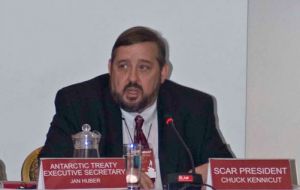MercoPress. South Atlantic News Agency
The future of Antarctic science will depend on international cooperation
 Kennicut: The increased cost of fuel oil and a complex global economic situation, have triggered the need to optimize the joint work of nations.
Kennicut: The increased cost of fuel oil and a complex global economic situation, have triggered the need to optimize the joint work of nations. The National Antarctic Programs have reached a consensus that international cooperation will be the clue for the future development of polar science. This is the main topic of discussion at the XXI Annual Meeting of the Council of Managers of Antarctic Programs (COMNAP), especially with increased costs associated with support, logistics and infrastructure necessary to carry out the scientific research in the White Continent.
In his presentation to delegates from 26 countries the President of the Scientific Committee on Antarctic Research (SCAR, the most important body in Antarctic science worldwide), Chuck Kennicut, emphasized the importance ”to produce a comprehensive dialogue in the Antarctic community about the role of international cooperation in the optimization of national resources, mainly for economic reality. This will encourage the nations that have programs in Antarctica, to capitalize the benefits of coordination and partnership,” says Kennicut.
Chile is also one of the nations involved in the consolidation of this vision. Dr. Marcelo Leppe, in charge of International Cooperation, Chilean Antarctic Institute (INACH), thinks that collaboration will bring a greater range of benefits, such as the ability to cover larger geographical areas in the studies, the development of human capital advanced, multidisciplinarity to address and involve the emerging countries in polar science to the forefront of studies of more developed nations.
“If we had databases on which activity is developing country, as in the Antarctic Peninsula, we could to avoid duplication of scientific efforts, safeguarding not only the science that we do is a contribution to knowledge but also ensure that resources are well spent,” Leppe comments.
For Kennicut, the main opportunities for international cooperation are related to sharing infrastructure and logistics, improving geographical coverage, common technologies, standardization of techniques and measurements, and administration of information and data exchange by Antarctic programs.
“The importance of Antarctic science to the big global issues has never been greater and the opportunities to increase these efforts to require a more relevant international coordination and partnership as a cornerstone of future scientific research in Antarctica,” said Kennicut.
Countries like Spain and Bulgaria have begun a very close cooperation with Chile. Christo Pimpirev, Director of the Bulgarian Antarctic Program, explains that “logistical cooperation is very important because without support from the countries with more experience and logistics, our Antarctic program, which has only 20 years of existence, not might work.”
Juan José Dañobeitia, Director of the Marine Technology Unit of the Higher Council for Scientific Research of Spain, said that ”the fact that INACH has moved to Punta Arenas is extremely important, and this effort to Chile has been highly valued by my country. We hope that the collaboration of scientific, technical and logistics will be consolidated and increased. In fact, we are assessing a common Antarctic program with cofinancing between Chile and Spain.”
At this moment, 15 programs each year use Punta Arenas as a gateway to the frozen continent: Russia, Ukraine, Spain, Bulgaria, Czech Republic, Germany, China, Korea, Brazil, United States, Uruguay, Ecuador, Peru, Poland, United Kingdom.
The meeting will end on Thursday with bilateral and multilateral meetings to encourage exchanges of information, services and human capital among countries that operate in the same geographical areas, such as the Antarctic Peninsula, the eastern sector of Antarctica and the Ross Sea. The reunion, organized by the INACH, technical body under the Ministry of Foreign Affairs, has brought together 120 people from 3 to August 6, the Hotel Dreams Punta Arenas Convention Center.




Top Comments
Disclaimer & comment rulesCommenting for this story is now closed.
If you have a Facebook account, become a fan and comment on our Facebook Page!